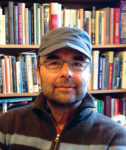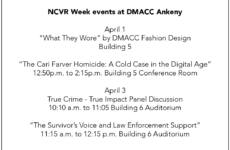
Charles D’Ambrosio
Celebration of Literary Arts at DMACC is April 3-5. Charles D’Ambrosio from the Iowa Writer’s Workshop will be coming Wednesday April 5 at 12:50 p.m. in Building 2, room 25B for a reading and book signing.
How did you become interested in writing short stories/ fiction?
—I have to say there was a prior interest, an interest in language, in sentences, in the whole music of prose, long before I found any specific vessel or container for my curiosity. Language was the fascination, and it was fundamental, and it remains so today. It’s sort of like if you were a potter, throwing pots. You might be the kind of person who loves to see the finished product on a shelf, who loves the vessel, the cup or the vase or the bowl; or you might be the kind of person who really just loves to sink your hands in wet clay. I’m a wet clay kind of writer.
What made you want to become a writer?
—I may have just answered that, but further, I’d say I reached a point in my life where writing seemed inevitable and inescapable. I’d always read a ton, scribbled in journals, lavished an inordinate amount of care and concern on even the most trivial school paper or essay, agonized over my few attempts at journalism —all as a somewhat hesitant and roundabout way of coming to the truth, that I wanted to write. That I had to write. That failing to do so would be (in George Orwell’s words) an outrage to my nature.
What is your writing process like?
—that’s a hard one to answer, in part because the process varies, depending on what I’m writing —fiction or personal essays— and the matter at hand. Different stories demand different approaches, and the personal essays seem to have their own mysterious path, each time out. What’s common to the process is an openness to that mysterious unfolding, to the gifts that come my way, a love of all the accidents and errors that then usher in a little truth, and a willingness to write and rewrite.
The works you are most proud of?
—Pride isn’t really a feeling that attends the finished work. When the thing’s done it’s out of my hands, it’s gone, there’s little I can do about it —but mainly, after the writing, the experience is over, and it’s on to the next thing. I don’t really think about the work once I’m done working. Now and then I’ll give a reading and hear the sentences as if some stranger had written them and I’ll think, hey, that’s not too bad. And I’m pleased, quietly pleased. But then, just as often, I hear those sentences, and wish that I’d done a better job. It’s best to move on, I guess.
Who/ what is your inspiration for your writing?
—My relationship to the muse is probably serial-monogamous. It varies. And I don’t really like to talk about it.
What advice do you have for college students who want to write?
—Write! And read! And reread and rewrite! At a certain point you just have to dive in, take the plunge, live the life as if you had nothing to fear. Accept that you are remaking yourself. In a miserable winter long ago, during the Great Depression, Bucky Fuller stuffed his pockets with stones and walked out into Lake Michigan. He had no money, his daughter was seriously ill, his work had come to nothing, and he was planning to take that one-way dip. To end it all. But he heard a voice, a voice that said: This is not about you. And then he heard another voice, a voice inside the first voice that said: Even you is not about you. And he walked out of the lake, determined to conduct the rest of his life as if it were an experiment. Such as it is, that’s my advice to everyone, college student or not, writer or not. Conduct the experiment.





Comments